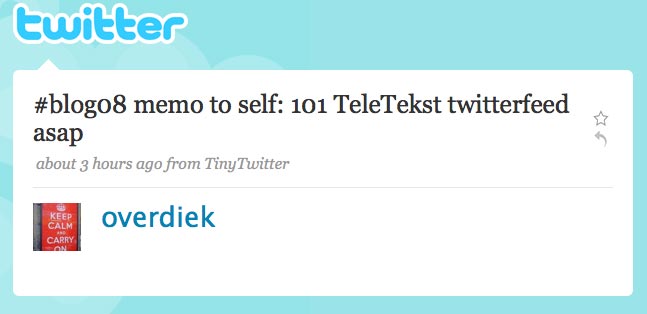Not your average panel with Tim Overdiek, deputy editor in chief at NOS news; Clo Willaerts, marketing manager for Sanoma Magazines Belgium; Paul Bradshaw from the Online Journalism Blog; and Piet Bakker, professor at the Hogeschool Utrecht.
The journalism/blogging panel aims to answer questions gathered via de Nieuwe Reporter, one of the largest Dutch journalism blogs.
Tim Overdiek from NOS News shares that over a hundred NOS colleagues from a total of 400 have contributed to weblogs.nos.nl. Only forty employees are active bloggers but a hundred contributions in the form of either comments or blog posts is a certainly good number.
He remarks that professional journalists often don’t see bloggers as collaborators but as a form of contribution, as something they can use. There is no direct participation. The participating journalism that Dan Gillmor refers to is not happening in the Netherlands, according to Overdiek.
We’re currently moving beyond blogs, and the practice of blogging has gone beyond the medium of the blog and has partly and moved to Twitter for example. There is a whole world to gain for bloggers and also for organisations to actively set out to get people blogging.
It is interesting to note that during one of the previous sessions Tim Overdiek sent out a tweet to remind himself to create a 101 Teletekst Twitterfeed asap.

Teletekst is the Dutch equivalent of the BBC Ceefax and the 101 page is the standard page for news headlines. It is interesting to see how one of the most popular ways to keep up with the news is going to be syndicated on Twitter in the near future. The NOS is focusing on embracing the new social media and sees syndicating existing content on different platforms as the next step.
The question that was selected from the Nieuwe Reporter was a rather odd choice since there was a lot of discussion about the relevance and phrasing of the question in the comments (in Dutch). Unfortunately the question also eventually drived the discussion nowhere:
Imagine there would be a stock exchange for newspapers, broadcasters, magazines, weblogs, and other media. Which stocks would you buy when taking the next five years in account?
Tim Overdiek: Buy stocks in NOS, we have great outlets, we have different platforms such as mobile TV, blogging and Twitter. The NOS media department is pretty tech savvy. However, he advises not to bet on just one company because there are too many interesting things going on in different places.
Piet Bakker would buy stocks in magazines because the problem with blogging and internet is that to monetize it is quite difficult.
Paul Bradshaw would also buy stocks in magazines because all of the advertising on the internet pretty much goes to Google. Offline and online advertising are not on the same level yet and on top of that magazines have a lot of muscle. Bradshaw thinks that they will buy out successful blogs. Newspapers are also trying to be more like magazines which shows the bright future of magazines but they don’t see it quite yet. casinochan signup
Journalists should work with bloggers on a level playing field. He [Bradshaw] mentions the example of a newspaper that recently recruited 40 bloggers but it’s not a top down relationship with one main editor that makes all the decisions. He sees this as a good way forward because journalists and bloggers should treat each other like citizens.